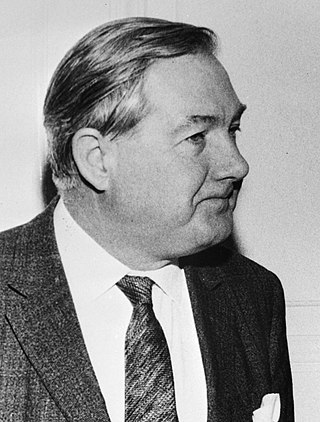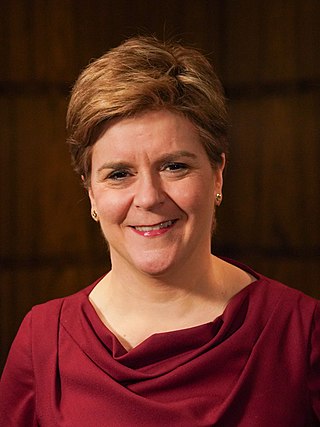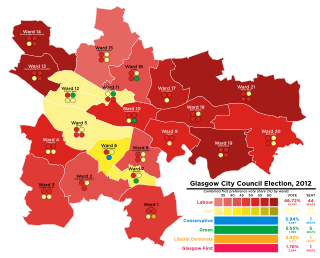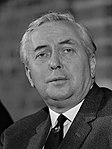The Scottish National Party is a Scottish nationalist and social democratic political party in Scotland. The SNP supports and campaigns for Scottish independence or secession from the United Kingdom and for Scotland's membership of the European Union, with a platform based on civic nationalism. The SNP is currently the largest political party in Scotland, where it has the most seats in the Scottish Parliament and 44 out of the 59 Scottish seats in the House of Commons in Westminster. The current Scottish National Party leader is Humza Yousaf, who replaced Nicola Sturgeon after a leadership election on 27 March 2023.

Aberdeen City Council is the local government authority for the city of Aberdeen, Scotland. It was created in 1996, under the Local Government etc. (Scotland) Act 1994, though a sense of Aberdeen as a city, with its own city council, can be traced back to 1900, when the county of the city of Aberdeen was created.

Renfrewshire is one of the 32 council areas of Scotland.

The politics of Scotland operate within the constitution of the United Kingdom, of which Scotland is a country. Scotland is a democracy, being represented in both the Scottish Parliament and the Parliament of the United Kingdom since the Scotland Act 1998. Most executive power is exercised by the Scottish Government, led by the First Minister of Scotland, the head of government in a multi-party system. The judiciary of Scotland, dealing with Scots law, is independent of the legislature and the Scottish Government. Scots law is primarily determined by the Scottish Parliament. The Scottish Government shares some executive powers with the Government of the United Kingdom's Scotland Office, a British government department led by the Secretary of State for Scotland.

The first elections to the new local authorities established by the Local Government Act 1972 in England and Wales and the new Northern Ireland district councils created by the Local Government Act 1972 took place in 1973. Elections to the existing Greater London Council also took place.

Politics in the Dundee Citycouncil area are evident in the deliberations and decisions of Dundee City Council, in elections to the council, and in elections to the Scottish Parliament (Holyrood) and the House of Commons of the Parliament of the United Kingdom (Westminster).
The Politics of Aberdeen, Scotland have changed significantly in recent years. In 1996, under the Local Government etc. (Scotland) Act 1994, Grampian Regional Council and Aberdeen District Council were dissolved, creating the new unitary Aberdeen City Council to represent the city's council area.

Elections for the Scottish district councils were held in 1977.

The 2021 Scottish Parliament election took place on 6 May 2021, under the provisions of the Scotland Act 1998. All 129 Members of the Scottish Parliament were elected in the sixth election since the parliament was re-established in 1999. The election was held alongside the Senedd election, English local elections, London Assembly and mayoral election and the Hartlepool by-election.

Regional elections were held in Scotland on 5 May 1994, as part of the Local Government (Scotland) Act 1973. These were the last elections before 29 new mainland unitary authorities, established by the Local Government etc. (Scotland) Act 1994, came into effect. The councils up for election were last contested in 1990 Scottish regional elections, and vote and seat changes are compared to the 1990 results.

Elections for the Scottish district councils were held in 1980.

Elections to Angus Council were held on 3 May 2012 the same day as the other Scottish local government elections. The election used the eight wards, created as a result of the Local Governance (Scotland) Act 2004, with each ward electing three or four councillors using the single transferable vote system form of proportional representation, with 29 Councillors being elected.

Elections to Glasgow City Council were held on 3 May 2012, the same day as the other Scottish local government elections. The election was the second using 21 new wards created as a result of the Local Governance (Scotland) Act 2004, each ward elected three or four councillors using the single transferable vote system form of proportional representation.

The 2012 Midlothian Council election took place on 3 May 2012 to elect members of Midlothian Council. The election used the six wards created as a result of the Local Governance (Scotland) Act 2004, with each ward electing three or four Councillors using the single transferable vote system form of proportional representation, with 18 Councillors being elected.
The sixth and last election to Tayside Regional Council was held on 5 May 1994 as part of the wider 1994 Scottish regional elections. The election saw the Scottish National Party overtaking Labour to become the council's largest party, and following the election the SNP formed a minority administration. The Conservatives lost 10 seats and became the third largest party. 8 weeks later, leader of the council Lena Graham resigned 'for personal reasons' and Ewan Dow took over as council leader.

Elections to Fife Council were held on 4 May 2017, the same day as the other Scottish local government elections. The election used the 22 wards created as a result of the Local Government Commission for Scotland's 5th review which was published in September 2016, with each ward electing three or four councillors using the single transferable vote system form of proportional representation, with 75 councillors elected; a decrease of three seats from 2012 as one ward, The Lochs, was abolished.

The 2022 Scottish local elections were held on 5 May 2022, as part of the 2022 United Kingdom local elections. All 1,227 seats across all 32 Scottish local authorities were up for election and voter turnout was 44.8%.

Elections to South Lanarkshire Council took place on 5 May 2022 on the same day as the 31 other Scottish local government elections.
Elections to East Ayrshire Council took place on 5 May 2022 on the same day as the 31 other Scottish local government elections. For the third consecutive election, the Scottish National Party (SNP) were returned as the largest party with 14 seats but remained shy of an overall majority. Labour gained back some of the ground they had lost at the previous election and were again returned as the second-largest party with 10 seats. The Conservatives lost one-third of their seats to return four councillors while The Rubbish Party retained their only seat. Three independent candidates were also elected.

Elections to Aberdeenshire Council took place on Thursday 5 May 2022 on the same day as the 31 other Scottish local government elections.


















